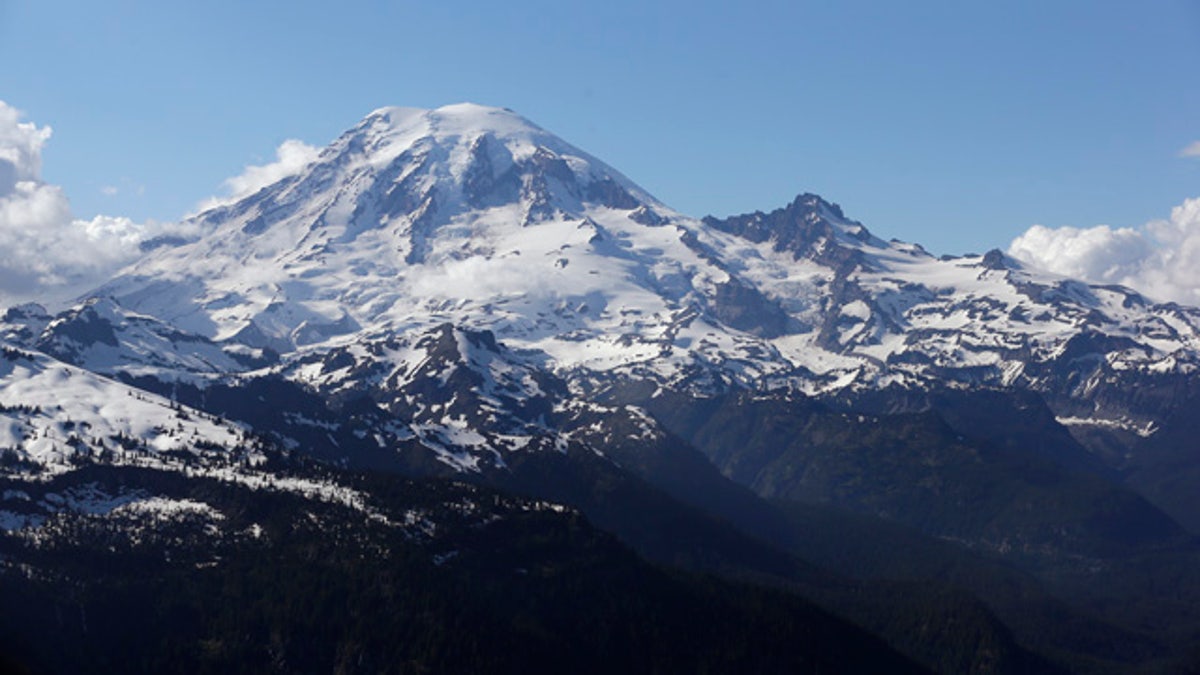
FILE -- In this file photo taken June 19, 2013, Mount Rainier is seen from a helicopter flying south of the mountain and west of Yakima, Wash. (AP Photo/Elaine Thompson, File)
SEATTLE – The location of the three bodies was revealed by the melting snow, but getting to them was another matter. They were high on a glacier at one of the most treacherous spots on Mount Rainier, an area pummeled by falling ice and rocks.
So rangers borrowed a tool from their colleagues at Denali National Park in Alaska -- a mechanical claw that's so highly specialized it hasn't been used in years.
A helicopter equipped with the device plucked the bodies of the three climbers off Mount Rainier on Tuesday, in the same area where a party of six vanished last May.
A crew on a training flight spotted the bodies in an avalanche debris field Aug. 7, but the area, at the 9,500-foot level on the Carbon Glacier, was considered risky for a typical recovery operation. Warm weather has led to more ice and rock falls as well as the opening of new crevasses, making it one of the most hazardous spots on the 14,410-foot volcano, said Mount Rainier National Park spokeswoman Patti Wold.
Rangers teamed up with Olympia-based NorthWest Helicopters to use the mechanical grabber. It was mounted at the end of 100-foot-long line, saving crews from having to lower a mountaineering ranger down to the glacier.
"It's got three or four prongs that open and close," Wold said. "Those games in the grocery store where you use the claw to grab the toys -- it operates similar to that."
The six, all experienced mountaineers, included two guides and four climbers. They went missing the last week of May on a technical, dangerous and little-used route up Liberty Ridge. Authorities believe they fell 3,300 feet.
The climbers had traveled from as far away as Singapore to ascend the glacial peak. Members of the group were Seattle-based Alpine Ascents International guides Matthew Hegeman and Eitan Green; Erik Britton Kolb, a 34-year-old finance manager at American Express, who had traveled from New York; Uday Marty, a vice president and managing director of Intel in Southeast Asia who was based in Singapore; Seattle mountain climber John Mullally; and Mark Mahaney, of St. Paul, Minnesota.
Last year, about 10,800 people attempted to climb Mount Rainier and only 129 used the Liberty Ridge route, according to park statistics.
While the Park Service believes the bodies recovered are those of members of the missing party, official confirmation will come from the Pierce County Medical Examiner's Office, Wold said.
There was no sign of the other climbers during Tuesday's operation.
Denali National Park commissioned a Eugene, Oregon, company called Heli-Tech to make the mechanical claw in 1995, according to a report in The Register-Guard newspaper the following year. It's similar to devices the company had made for logging, farming and other purposes, but with high-altitude adaptations. It's made of lighter-weight aluminum instead of steel and uses electric controls instead of gas-powered ones.
The device was used for the first time in 1996 to recover a climber who fell at the 16,000-foot level on Denali. It wasn't immediately clear how many times it's been used since. Denali mountaineering ranger Brandon Latham said Wednesday it hadn't been used in the seven years he's been stationed there. Nor was he aware of it ever having been loaned out.
"They're a very specialized tool that helps us perform an operation with the helicopter where otherwise putting a rescuer on the other end of the line would be too risky," he said.
Denali's helicopter manager, Joe Reichert, has been in Washington state helping to fight wildfires and helped arrange for the device to be shipped to Rainier, Latham said.
"We knew from the get-go what was going on and what had happened and the trouble Rainier was having trying to reach the folks after they found them," Latham said. "There was a lot of discussion on pros and cons, on the best ways to handle it and recover the bodies for the families. This was an option that was thrown out on the table."
NorthWest helicopters performed some tests to make sure the claw was compatible with their MD-530 helicopter, Wold said. Eight park rangers were involved in the planning and execution of the operation.

